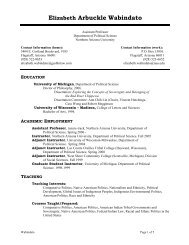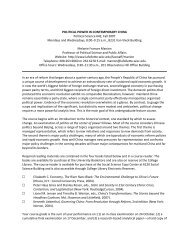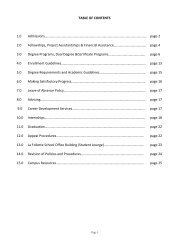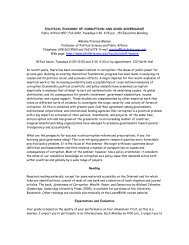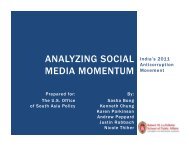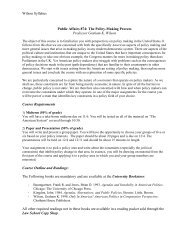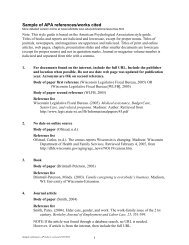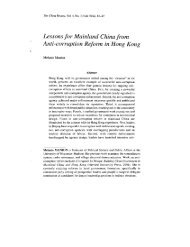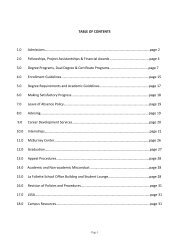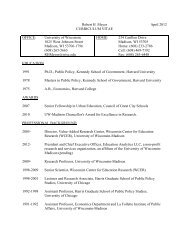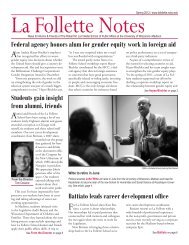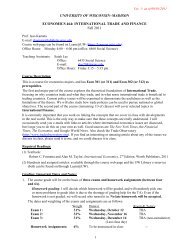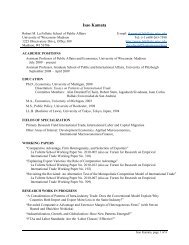SAVE Commission's findings - La Follette School of Public Affairs ...
SAVE Commission's findings - La Follette School of Public Affairs ...
SAVE Commission's findings - La Follette School of Public Affairs ...
Create successful ePaper yourself
Turn your PDF publications into a flip-book with our unique Google optimized e-Paper software.
technology. More input should be sought, however,<br />
by creating a high level advisory function<br />
that goes beyond just planning.<br />
Advice should cover the full range <strong>of</strong> converging<br />
technologies, heeding the advice <strong>of</strong> Dan<br />
Burrus and the recent Carnegie Commission<br />
that advised state government on technology’s<br />
use. The input should go beyond the business<br />
planning process, toward helping state government<br />
look at its technology system from the<br />
outside in. The advice also should help state<br />
and local government work as one system, not<br />
as a collection <strong>of</strong> independent agencies. This<br />
will focus coordination on program results and<br />
not just hardware and systems.<br />
Compared to youth, many adults are inadequate<br />
in thinking creatively about technology.<br />
Therefore, youth might advise the state in<br />
using technology. Young people have been<br />
raised on multi-media games such as SimCity<br />
and Carmen Sandiego. They can guide adults,<br />
especially educators, on how to use technology<br />
for effectiveness, not efficiency. Youth also<br />
can help adults break out <strong>of</strong> their industrialage<br />
thinking and can guide the them on choices<br />
for educational s<strong>of</strong>tware to benefit Wisconsin.<br />
COORDINATE DISTANCE LEARNING<br />
Educational agencies are using distance<br />
learning as a part <strong>of</strong> cost effective teaching.<br />
However, the potential generators <strong>of</strong> distance<br />
learning content, inside and outside Wisconsin,<br />
present a coordination problem. Inside the<br />
state, the University <strong>of</strong> Wisconsin should be<br />
designated a distance learning content coordinator<br />
for state agencies, including the technical<br />
colleges and new Department for Education.<br />
The coordination should not involve control<br />
<strong>of</strong> content, but focus on best use <strong>of</strong> system<br />
capacity and avoiding duplication wherever<br />
possible. Simply put, there should not be two<br />
half-filled distance learning classes at the same<br />
time.<br />
REVISE TECHNOLOGY PROCUREMENT<br />
Costly procurement mistakes have been<br />
made in the public and private sector because<br />
purchasing policies use an industrial age model<br />
<strong>of</strong> product uniformity, mass production and<br />
distrust. The result <strong>of</strong> this lack <strong>of</strong> sophistication,<br />
especially in a large state bureaucracy, can<br />
be substantial.<br />
Wisconsin’s rigid procurement policies<br />
need overhauling to meet high-tech realities.<br />
Procurement specialists, essentially hired and<br />
rewarded for processing paper in a system that<br />
sometimes inhibits those who want to use technology,<br />
need to be transformed and retrained,<br />
along with the process.<br />
The result <strong>of</strong> this transfer: technology<br />
purchases made for value and total cost, not<br />
just unit price. As one employee said, that<br />
means changing the practice that prohibits a<br />
small <strong>of</strong>fice from buying a locally sold computer<br />
with a good service agreement and forces it to<br />
buy a computer <strong>of</strong>f a list with a poor service<br />
agreement.<br />
In a larger sense, management must ask<br />
better technology-related questions and get<br />
training on how to make information technology<br />
policy and procurement decisions to avoid<br />
repeating past mistakes.<br />
Actions<br />
14.1<br />
Create a state<br />
technology fund.<br />
14.2<br />
Train and reculture<br />
employees for the<br />
technological age.<br />
14.3<br />
Affirm information<br />
technology as the major<br />
presentation device.<br />
14.4<br />
Create a high level<br />
technology advisory<br />
function.<br />
14.5<br />
Coordinate distance<br />
learning.<br />
14.6<br />
Revamp purchasing<br />
laws covering high-tech.<br />
State Employee<br />
“Educate upper<br />
management in the<br />
proper application <strong>of</strong><br />
technology. All they<br />
know are buzzwords.”<br />
R E S U L T S<br />
Using technology will:<br />
1 Enable citizens to interact with<br />
government faster and cheaper.<br />
2 Enable government to be more<br />
responsive to citizens and to<br />
improve the quality as well as<br />
timeliness <strong>of</strong> their response by<br />
giving citizens remote access to<br />
both government and<br />
education.<br />
3 Encourage state government to<br />
invest in the technological<br />
training and equipping <strong>of</strong> its<br />
managers and employees so<br />
they are able to take advantage<br />
<strong>of</strong> information technology to do<br />
their jobs better.<br />
4 Even out the technological<br />
sophistication <strong>of</strong> services<br />
across state government, which<br />
currently varies from very high<br />
technology to primitive.<br />
5 Require significant initial<br />
investment which will be paid<br />
back in long term productivity<br />
gains and reduced operating<br />
costs compared to labor<br />
intensive, non-technological<br />
delivery <strong>of</strong> services.<br />
6 Continue to move Wisconsin<br />
government products out <strong>of</strong> the<br />
paper and printed form age and<br />
into the electronic information<br />
age.<br />
CITIZEN • COMMUNITY • GOVERNMENT — WISCONSIN: THE 21 ST CENTURY 41



